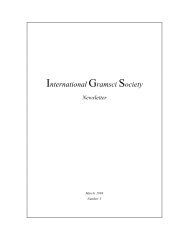You also want an ePaper? Increase the reach of your titles
YUMPU automatically turns print PDFs into web optimized ePapers that Google loves.
Engels's writings on revolution and on the concept of democracy. Nevertheless, Texier's workshould be required reading for anyone who wishes to understand <strong>Gramsci</strong>'s views on the 19thcentury which are the core of his understanding of revolutionary processes. It would, in fact, beaccurate to say that this study constitutes a <strong>Gramsci</strong>an reading of Marx and Engels.Giuseppe Vacca. Appuntamenti con <strong>Gramsci</strong>. Rome: Carocci Editore, , 1999.This work is conceived as an introduction to the study of the Quaderni. Relying heavily on achronological analysis of <strong>Gramsci</strong>'s work, Vacca looks at the evolution of <strong>Gramsci</strong>'s thought as anprogressively radical repudiation of the direction in which the communist movement was beingguided by Stalin. Vacca sets out to demonstrate that in <strong>Gramsci</strong> one finds a profound re-thinking ofthe Marxist tradition—so profound, in fact, that in the course of his exposition Vacca makes<strong>Gramsci</strong> appear to be a precursor of neo-liberlism or, at least, of "third way" politics.CONTENTS:Introduzione: Egemonia e democraziaI. 1926-1937: la linea d'ombra nei rapporti con il Comintern e il partitoII. Togliatti editore delle Lettere e dei QuaderniIII. L'interpretazione dei Quaderni nel dopoguerraIV. La "quistione politica degli intellettuali" e la concezione dello Stato. Nomenclatura dei QuaderniV. L'anilisi dell'URSS stalinianaVI. La politica come egemoniaThe Philosophical Forum, Vol. XXIX, nos. 3-4, (Spring-Summer 1998), is a special issue on"Antonio <strong>Gramsci</strong>: Philosophy, Politics, and Culture" compiled by guest editor Benedetto Fontana.In addition to a brief introduction by Fontana, it contains the following aricles:Renato Zangheri: "Notes on <strong>Gramsci</strong> and the Twentieth Century"Benedetto Fontana: "Politics, Philosophy, and Modernity in <strong>Gramsci</strong>"Maurice A. Finocchiaro: "Democracy, Philosophy, and <strong>Gramsci</strong>"Richard Bellamy: "<strong>Gramsci</strong> and Walzer on the Intellectual as Social Critic"Joseph V. Femia: "<strong>Gramsci</strong> and the Question of Transformation"Nadia Urbinati: "Detecting Democratic Modernity: Antonio <strong>Gramsci</strong> on Individualism and Equality"Dante Germino and Meindert Fennema: "Antonio <strong>Gramsci</strong> on the Culture of Violence and its Overturning"Anne Showstack Sassoon: "Family, Civil <strong>Society</strong>, State: Is <strong>Gramsci</strong>'s Concept of società civile still relevant?"Kate Crehan: "'A Vague Passion for a Vague Proletarian Culture': An Anthropologist Reads <strong>Gramsci</strong>"Mauro Pala: "<strong>Gramsci</strong>'s Spelling of Keywords: From Williams' and <strong>Gramsci</strong>'s Theories of Language to CulturalHegemony"Robert S. Dombroski: "A Note on <strong>Gramsci</strong> and Literature"— 39 —



